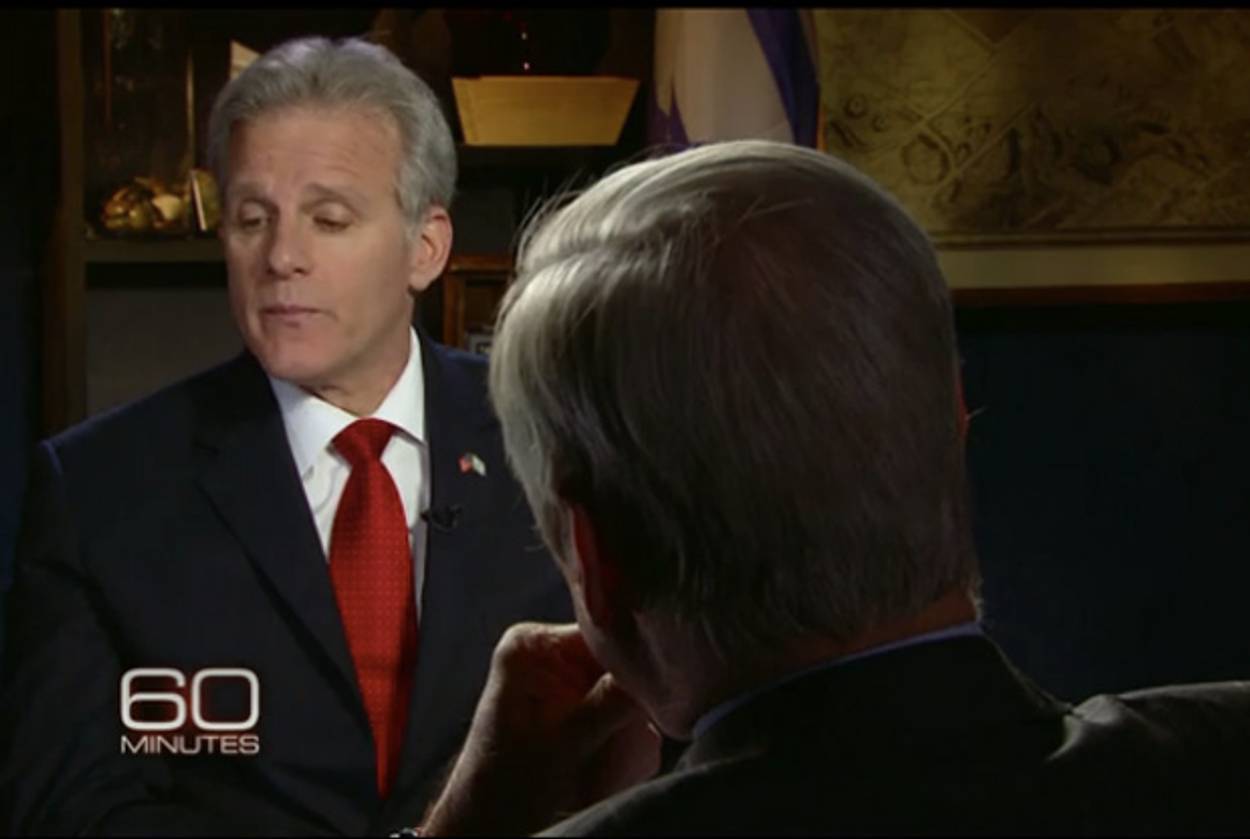’60 Minutes’ vs. Israel On Palestinian Christians
Ambassador Oren tried to discourage ‘hatchet job’




Last night, 60 Minutes broadcast a segment reporting that the Israeli occupation has led to the evaporation of Jerusalem’s and the West Bank’s Palestinian Christian communities. Reporter Bob Simon confronted Israeli Ambassador Michael Oren with the fact that Oren had contacted the head of CBS News to try get the story spiked, and Oren’s reponse was, “Well, there’s a first time for everything.”
I thought Oren came off lamely, almost deliberately so, as though he feared appearing impotent less than he did all-powerful. I don’t see why the Israeli ambassador should be embarrassed about fighting stories that make Israel look bad; I’m sure U.S. diplomats around the world do it all the time. It’s past time we stopped calling run-of-the-mill government public-relations efforts by its Hebrew name, hasbara, and automatically assuming it is clumsy, sinister, or both (it sometimes is, but it isn’t by definition). Instead of dissembling, I wish Oren had responded to the effect of, “You’re damn right I called your boss, because your story sounds like it’s going to be B.S.”
Because here’s the thing: the story is kind of B.S. At one point, Simon notes the obstacles that West Bank checkpoints impose on Palestinian Christians, as though this were something Christians were specifically targeted for or uniquely suffer from. He thinks he is taking an original angle on the Israeli-Palestinian conflict, but he is really just rehashing it and unfairly narrowing it in such a way that ignorant viewers may get that incorrect impression. (By confusing what the conflict is really about, this report actually does the cause of Palestinian rights a disservice. Its divide-and-conquer mindset arguably comes from the British Empire’s playbook.) While the show was menschy enough to air influential Haaretz columnist Ari Shavit calmly explaining what was wrong with the segment’s premise—namely, “Israel is not persecuting Christians as Christians. The Christians in the Holy Land suffer from Israeli policies that are a result of the overall tragic situation”—it might have actually taken Shavit’s words to heart.
It’s not that 60 Minutes should be focusing on every Arab Christian community other than the Palestinians’ during the Arab Spring, when the Christian minorities in nearby countries (most notably Egypt) have suffered tremendously, as Oren himself noted in a recent op-ed. It’s a “newsmagazine,” not a newspaper, with a mandate to include not all the news that’s fit to print but merely the stories they think will be most compelling to their viewers. Similarly, of course the reporter is going to melodramatically visit the home in Bethlehem that’s surrounded on three sides by the security wall and that also sells Christian tchotchkes on the ground floor. It’s television! For a further guide, consult Paddy Chayefsky’s Network.
But the segment goes too far in its singleminded blaming of Israel and the occupation for the stream of Christians skipping town. From the segment, you would think Islamist parties like, say, Hamas play a negligible role in contemporary Palestinian politics. One senses that 60 Minutes felt they had an ironic human-interest story on their hands, which could be gussied up with footage of Christians celebrating Easter at the very spot where Jesus was resurrected. “Hatchet job,” the word Oren apparently used with the CBS News chief, is a little much, but he was correct to sense that the segment would be problematic without having the benefit of having seen the segment first: it lacks any sort of newspeg, and therefore was bound to create one and hang Israel from it. (An interesting story, for example, is how some Christians have lately identified with the Palestinian cause, but a different magazine of Jewish life and culture beat them to that.)
And the segment positively crosses a journalistic line when it attempts, in classic 60 Minutes fashion, to both report the story and be the story. “For Israel, there could be serious economic consequences,” Simon “reports.” “According to Israeli government figures, tourism is a multi-billion dollar business there. Most tourists are Christian. Many of them are American.” The late, great Mike Wallace was the master of this maneuver, of discussing the consequences of what he had just revealed in real time. The difference is that when Wallace did it, he had the goods; Simon’s smoking gun is the importance of tourism to Israel, “many,” and “most.” Weak.
Here’s the segment:
Related: Israel and the Plight of Mideast Christians [WSJ]
Christians for Palestine [Tablet Magazine]
Marc Tracy is a staff writer at The New Republic, and was previously a staff writer at Tablet. He tweets @marcatracy.